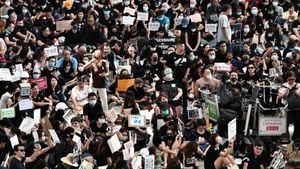On November 12, 2024, Eric Gonzalez took the stand at Daniel Penny's manslaughter trial, admitting he had misled police following the highly publicized choking death of Jordan Neely on the New York City subway. Gonzalez, who was seen on video helping restrain Neely during the incident, now acknowledges his initial statement—that Neely had tried to hit him—was fabricated out of fear after hearing about Neely's death. This admission adds another layer of complexity to the already contentious trial surrounding the tragic events of May 2023.
The courtroom was packed as Gonzalez testified how his initial account was intended to distance himself from the charges he feared might come. "I was trying to justify my actions for me having my hands on him," he told Assistant District Attorney Dafna Yoran, head hung low. His testimony reveals not only the moral turmoil he faced but also the tension surrounding public perception after the incident occurred.
For those unfamiliar with the case, it began when Jordan Neely, who was unarmed and reportedly experiencing mental health issues, boarded the uptown F train and began yelling about his hunger and desperation. Witnesses indicated Neely's behavior was erratic, but he was not violent at any point. Despite this, Daniel Penny, a 26-year-old former Marine, placed Neely in a chokehold lasting approximately six minutes. The incident was captured on video, causing public outcry and debates over vigilantism and racial dynamics.
Gonzalez initially informed law enforcement he was on the train with Penny and Neely, claiming Neely’s purported aggression prompted Penny's chokehold. He later recanted this story when confronted with surveillance evidence showing he was not on the train until after the altercation had begun. "I’m scared for myself. I’m scared for my family," Gonzalez expressed, conveying the anxiety many felt following the widely circulated footage of Neely's tragic death.
During his testimony, Gonzalez described the chaos of the train's interior. He recounted seeing two men grappling on the floor, one being held down by Penny who was allegedly on top of Neely, applying pressure around Neely's neck. "People were yelling for someone to call the cops," Gonzalez remembered, emphasizing the mayhem and urgency of the situation. He testified how he jumped in to assist, grabbing onto Neely's arms, attempting to aid Penny rather than exacerbate the situation.
Gonzalez admitted to urging Penny, "Let him go, get your arm away from his neck," at one point during the struggle. Yet, the tension escalated, and he found himself still holding onto Neely instead of helping Penny release his grip. Video footage of the encounter has been described as both disturbing and telling—showing neighborhood reactions divided on whether vigilantism is ever justified on public transportation.
Penny's defense claims he acted out of fear for his own safety and those around him, arguing he meant to restrain Neely, not kill him. His attorneys are presenting the chokehold as something instigated by Neely’s aggressive posturing. Meanwhile, the prosecution argues this line of defense is insufficient, emphasizing the point of excessive force involved and the tragic outcome of Neely’s death.
Gonzalez's testimony on the stand was not just about recounting events but was also tempered with emotion, recognizing the moral weight of his decisions. “I didn’t think anything of it at the moment,” he stated, reflecting on how quick actions can spiral when panic reigns. His admission has reignited conversations about the responsibilities of witnesses and bystanders when situations go awry.
The ramifications of this incident are still playing out across New York City, where communities have rallied calling for justice for Neely. Protests erupted shortly after his death, raising awareness about mental health, public safety, and racial disparities. Activists have made it clear: they believe Neely's death must be seen within the broader narrative of systemic racism and the societal treatment of those experiencing mental health crises.
Since Gonzalez's testimony, the trial has entered its fourth week, with each passing day reminding the public of the gravity of the charges against Penny—manslaughter and criminally negligent homicide. If found guilty, he faces decades behind bars. The court's proceedings continue to serve as a microcosm for larger social issues, and the verdict will not just affect Penny and Gonzalez but will echo through the conversations around public safety and personal accountability.
With tensions high and emotions raw, one can only wonder how this case will shape discussions on the relationship between individuals on public transport and the perceptions of threat based on race, mental health, and economic status. The trial is not just about determining guilt or innocence; it dares to challenge New Yorkers to reflect on their assumptions of safety and justice within their urban environment.
Whether Penny’s actions were justified will be determined by the jury, but the impacts of this case are sure to resonate long after the final gavel falls. The broader reflections on vigilance, race, and the experience of those vulnerable on public transport remain at the forefront of community discussions.



